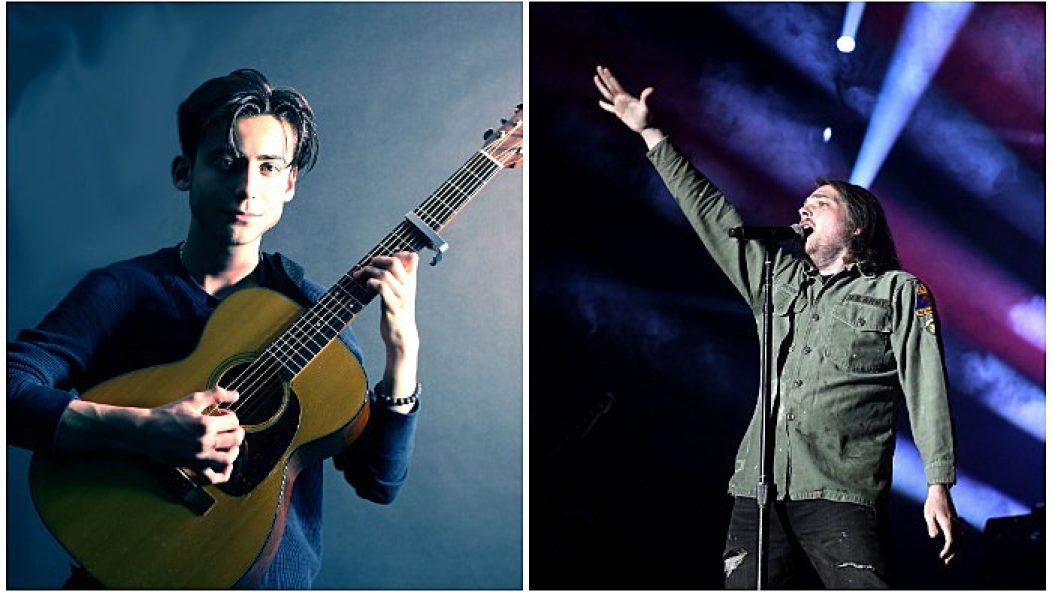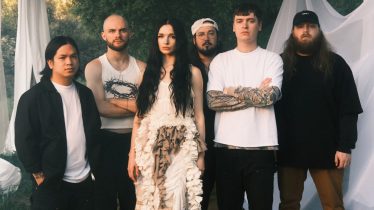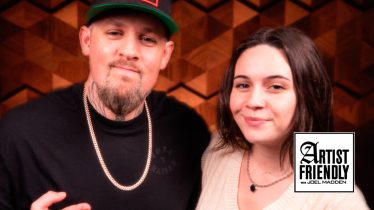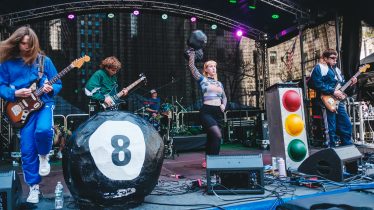
Here’s the one hint Gerard Way gave Aidan Gallagher before MCR’s return
Before being cast as Number Five on the Netflix series The Umbrella Academy, Aidan Gallagher admired My Chemical Romance’s deeply conceptualized concepts that helped shape him as a singer-songwriter.
Read more: Here’s when we’re finally getting ‘The Umbrella Academy’ season 2
Tell me about your experience hearing My Chemical Romance for the first time in your life.
Well, I think I was around the age of 10 when I first heard My Chemical Romance, and I remember instantly being hooked. I had never heard anything else like it before. There was a certain purity to the intensity that I was listening to that was really intriguing. And for me, that represented all through the ages and the peak of my interest when it came to them. So they really meant a lot to me.
Do you remember the first song you heard?
“Famous Last Words.” I started with The Black Parade, and I worked backward. I went back to Three Cheers, Bullets and then Danger Days. Throughout the years, I’ve always gone through different phases of which songs I like the most depending on what I listen to last.
Going back to Oct. 31, 2019 when the band started to roll out the “Return,” did you know this was happening? How did you react?
I had no hints. There was one thing. Gerard [Way] never gave me a hint, but I was out to lunch with him, and he was saying how he had revisited the songs and was talking about singing them. I didn’t realize it at the time, but looking back, it makes sense. When they first announced they were coming back, I just remember being extremely angsty and excited and [experiencing] pure happiness for about a week straight. At that point, I’d come to terms with the fact that I’d never see them live. And for any fan, that’s disappointing. But I’d already dealt with it. So then to see them come back during a time when I had gotten to know the band was a privilege that I could have never imagined when I was first being exposed to the music at age 10. In many ways, I’m just a fan who got very lucky.
Read more: Grimes updated her baby’s name but good luck trying to pronounce it still
That’s awesome. So you’ve obviously worked with Gerard on the Netflix series The Umbrella Academy, and you’ve created a relationship with him. What was it like seeing him in that musical setting versus working with him on set?
My perspective on Gerard never really changed. I don’t really pay attention to the medium in which he’s operating. I always look at him as this incredible creative force that creates these really interesting, offbeat, really depth-filled concepts that complement the stylistic qualities of My Chemical Romance really well. And it’s the reason why that music is so interesting and works with the melodic structure so well. And it’s the reason why Umbrella Academy was as interesting a world as it was. So I just see a creative force. I suppose the only difference between getting to work with him on Umbrella Academy and then seeing him live was a live MCR show was a continuous multihour experience where you get to see a group of really brilliant people doing something highly creative and expressive. It was very fun for me.
You’ve covered My Chemical Romance in the past before you were cast as Number Five. What was the significance of the band growing up to you, and why did you start covering them?
The significance of the band is they’re my favorite rock band that I’ve been exposed to. So growing up, they were always a reference point. If you look at the music I’m into, it’s incredibly diverse. I have no musical preference when it comes to genre. I’m just into really good music. So for me, they were always the best version of rock. I suppose covering them was my little fantasy of being able to work with that cover because it’s not really in my vocabulary. I’m much more of a singer-songwriter. But there’s a certain complexity and depth to their music that was really appealing. The small crossover that I had with that was a song like “Cancer” where there was something highly emotional about it and also relatively within my range as an artist to be able to do with one voice and one instrument.
So when you got to the live show, what was the track you wanted to hear more than anything else?
It’s tricky. It depends on what I was listening to before it. But I think around that time, it was probably “Mama.” The way that song begins is the perfect setup, an explanation for the texture of what follows. I love the way that it begins with the explosions and the hum of an amplifier just sort of rising into it. And for the verses, [there were] these really interesting melodic structures and [a] really interesting style. The power of the chorus and the evolution of the second verse and then turnaround of the bridge with probably the coolest power riff I’ve heard. Then after that, you have a slow move and the rise to build of this massive pirate chant that they have. So probably “Mama” because of all the different versions that it goes through. There’s a lot packed into that song. But looking back at it today, I’d probably much rather be excited for a song like “Party Poison” because I’m [more] into Danger Days now than I was with The Black Parade, but it changes all the time.
It’s like a seasonal change.
With every artist, you go through different phases of what record you like most of theirs.
What was the most memorable moment of the reunion show? Aside from hearing the track that you really wanted to hear at the time.
That’s a really tough question. It’s very much a Sophie’s Choice for me because I was getting to see my favorite rock band at my favorite concert, although they played all these songs from different albums that are all different, and it’s not like one is better than the other. They’re equally great. They’re just different colors of the same expression. So there was a moment backstage with Mikey [Way] on the balcony where I actually got to meet him in person. And at that point, I’d met all the other members of the band [Frank Iero, Ray Toro] and had conversations with them. And Mikey, I talked extensively through DM, but we’ve never actually met. We came close a few times, but we never met. So that was a very rewarding experience to have before I launched into this multihour journey.
That’s awesome. At the end of the day, what does My Chemical Romance mean to you as a fan, and more importantly, what do they mean to you as an artist?
As a fan, I look at it as purity of intensity, and that’s exactly what I want out of a rock band. They’ve always been the reference point of my favorite version of that genre. The perfect combination of style versus substance. As an artist, I very much analyze and look at all the reasons why they’re great. Whether it’s all the layers to it, if it’s the lighting, the complexity, the concepts they use or the melodic lines that are very catchy. And the way they compose melodic lines to work together as this extremely powerful ensemble to the way that it’s produced and engineered and then mixed. It’s the perfect execution of rock music, in my ears at least. I’m astounded by it. And as a writer, because rock music is not really what I do, I really connect with what Gerard’s able to do on a conceptual level because I’ve always struggled with coming up with concepts or ideas for a song. But melodic stuff has always been easy for me. I just have to put in the effort. So the depth that Gerard writes is something that’s very admirable as an artist.
This interview originally appeared in AltPress Issue #382 the My Chemical Romance Holy Book. You can order the issue here.








